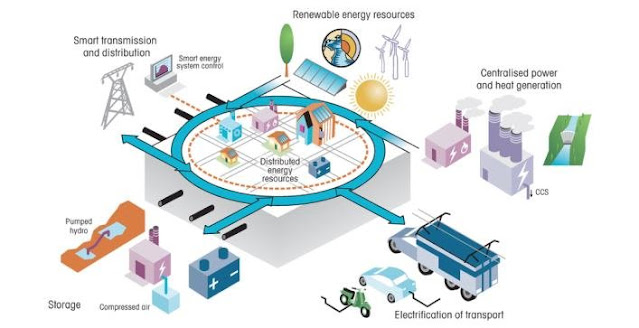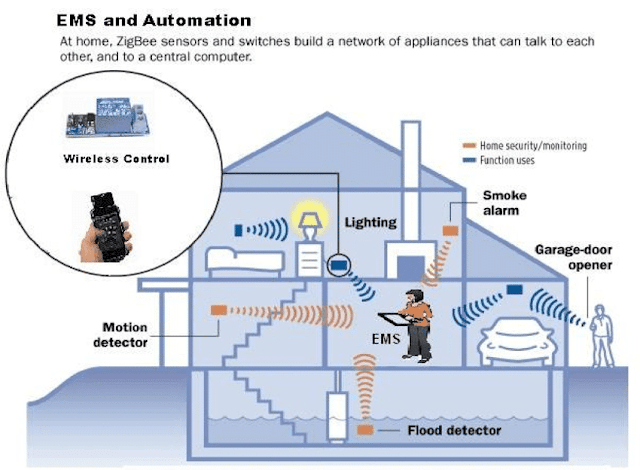What is smart energy management?
Smart Energy Management is a system and process for effectively managing energy use in systems and buildings. It uses technology and software to collect, analyze and adjust energy information, to optimize energy use, reduce unnecessary consumption, and enhance energy efficiency.
The goal of smart energy management is to provide a granular understanding and control of energy demand and consumption in real time. This requires data collection from sensors and energy measurement systems, data analysis to recognize consumption patterns and identify optimization opportunities, and implementation of control measures. tuned to improve energy efficiency.
Smart energy management can be applied to different types of systems and buildings, including commercial buildings, residential buildings, industrial facilities, and public infrastructure. It may include elements such as smart networks, smart building management systems (BMS), automatic control systems, and intelligent measurement systems.
Benefits of smart energy management include:
- Save energy and reduce costs: Optimizing energy use reduces unnecessary consumption and electricity costs.
- Enhanced energy efficiency: Smart power management improves the energy efficiency of devices and systems, enhancing efficiency and stability.
- Reducing carbon emissions: Reducing energy consumption leads to a reduction in carbon emissions and impact on the environment.
- Remote management and real-time monitoring: Smart energy management systems enable remote management and monitoring through an online interface and provide real-time information on energy consumption and efficiency capacity.
Smart energy management is an important part of smart building and sustainable energy systems, to optimize energy use and contribute to the goal of reducing environmental impact.
Technologies and intelligent energy management systems (EMS - Energy Management System) in construction.
In construction, technologies and intelligent energy management systems (EMS - Energy Management Systems) have become an important part of optimizing energy use and effectively managing the energy systems of buildings. buildings and industrial facilities. Here are some common smart energy management technologies and systems in the construction industry:
Smart Grids
Smart grid systems use information and telecommunications technology to collect, analyze, and coordinate energy-related information. They enable monitoring and adjustment of the energy needs of the equipment in the building system to optimize energy efficiency and reduce unnecessary energy consumption.
Smart sensors and measurement systems
Smart metering and sensor technology are used to collect data on energy consumption and performance of devices in a building. Sensors can be installed in electronics, lighting, HVAC (Air Conditioning, Ventilation, and Temperature Control) systems, and other devices to monitor and record data. energy material.
Smart Building Management System (BMS)
BMS is a system that integrates technologies to monitor and control devices and systems in a building. BMS helps optimize energy use by automatically adjusting HVAC, lighting, and other electrical equipment based on information from sensors and measurement systems.
Energy Management System (EMS)
EMS is a comprehensive management system that integrates technologies and software to manage, control and optimize energy use in a building or public system. Karma. EMS monitors, analyzes, and adjusts energy demand, enhancing efficiency and reducing unnecessary energy consumption through optimizing operation schedules, shutting down unused equipment, and using energy from renewable sources.
Intelligent control system
The intelligent control system uses automation technology and artificial intelligence to manage and control devices and systems in the building. They can automatically adjust lighting, temperature, humidity, and ventilation based on peripheral conditions and energy usage requirements, helping to optimize energy consumption and improve occupant comfort.
Smart energy management systems and technologies have enabled buildings and industrial facilities to optimize energy efficiency, reduce unnecessary energy consumption, and support sustainability goals in their use of energy use.
How to use sensors and automated systems to control and regulate energy use in lighting, air conditioning, and other electrical equipment in buildings.
Sensors and automated systems can be used to control and regulate energy use in lighting, air conditioning, and other electrical equipment in buildings. Here are some common ways to apply them:
Smart lighting:
- Motion sensor: Use a motion sensor to detect the presence of people in the area. When no one is present, the system automatically turns off the lights or reduces the light intensity to save energy.
- Natural Light Sensor: The natural light sensor monitors light levels from the surrounding environment. When natural light is enough, the system automatically adjusts the lights to reduce energy usage.
- Scheduled lighting control: The system automatically sets operating schedules for lighting devices, adjusting brightness levels based on time of day and usage needs.
Smart air conditioner:
- Temperature and humidity sensors: Temperature and humidity sensors are used to monitor environmental conditions. The air conditioning system automatically adjusts temperature, humidity, and fans to ensure comfort and save energy.
- Control via BMS system: A smart building management system (BMS) monitors and controls air conditioning equipment, ensuring efficient and energy-saving operation.
Smart electrical equipment:
- Smart power socket: The power outlet can be integrated with a motion sensor or light sensor to automatically turn off the power when there is no activity or enough light.
- Electronic Switches: Electronic switches can be used to control electrical appliances remotely and on a schedule, helping to turn off or reduce energy usage when not needed.
These sensors and automated systems are often integrated into an energy management system (EMS) or a smart building management system (BMS), allowing for automatic control and regulation of energy usage. based on predefined measurement parameters and rules.
Watch more: MEP Engineer
Watch more: professional engineer in Houston
Watch more: licensed engineer in Houston
Watch more: mep engineering firms in Houston
Watch more: design engineer in Houston
Watch more: HVAC engineering firms in Houston
Watch more: electrical engineering firms in Houston
Watch more: plumbing engineering firms in Houston
Watch more: mechanical engineering firms in Houston

